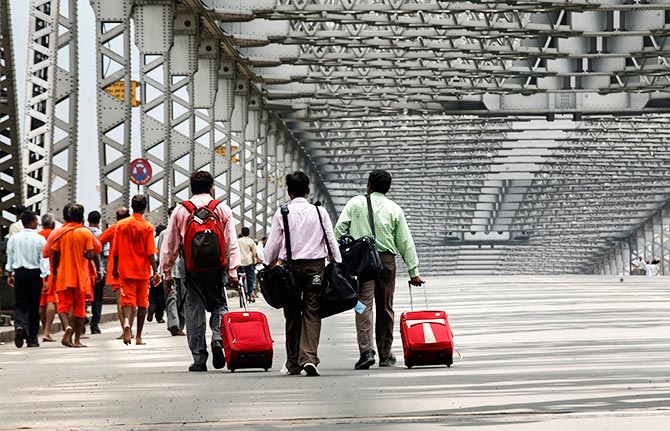On the night of February 3, 1943, the bridge -- believed to be the target of the Imperial Japanese Army Air Force -- was opened to the public.
A brief history of the structure that reflects the pulse of the City of Joy.
Don't miss: Howrah Bridge, a photographer's delight for 75 years
Howrah Bridge at 75

Traffic moves across Howrah Bridge in Kolkata.
Photograph:REUTERS/Rupak De Chowdhuri
The Howrah Bridge Act
The Howrah Bridge Act, 1926, was enacted to provide for construction, maintenance and control of a new bridge across the river Hooghly between Kolkata and Howrah.
The Commissioners for the Port of Calcutta were made the Commissioners for the bridge.
The Kolkata Port Trust is now the custodian of the bridge.

Howrah Bridge Illustration
Cantilever bridge
It is 2,150 feet long, with a clear span of 1,500 feet, and the highest point is 300 feet above ground level.
A tramcar was the first vehicle to roll down from the city-end to the station-end.
It was the third largest cantilever bridge at the time of its launch.
Consulting engineers, Rendel Palmer & Tritton, dealt with the construction. Cleveland Bridge and Engineering Company of Darlington were the contractors.

A rail is seen before finishing touches at the Tata Steel rails factory in Hayange, Eastern France.
Photograph:REUTERS/Vincent Kessler
Tata Steel
Tata Steel (then Tata Iron & Steel Company) supplied 23,500 tonnes of steel. The fabrication was done by Braithwaite, Burn & Jessop Construction at four different shops in Kolkata.
Around 3,000 tonnes of steel and a number of special items were made in England.

People walk on the Howrah Bridge.
Photograph:REUTERS/Jayanta Shaw
2003-2016

In 2003, paan-spit and bird droppings were found to have damaged the health of the structure.

The Kolkata Port Trust provided Rs 6.5 million to paint 2.2 million sq metres of the bridge. Around 26,500 litres of paint was used.
An inspection in 2011 showed spitting had reduced the thickness of the bridge from six millimetres to less than three millimetres.
Between 2013 and 2016 the expenditure for average annual maintenance was around Rs 25 million.

Around 100,000 vehicles and 150,000 pedestrians use it on a daily basis.




